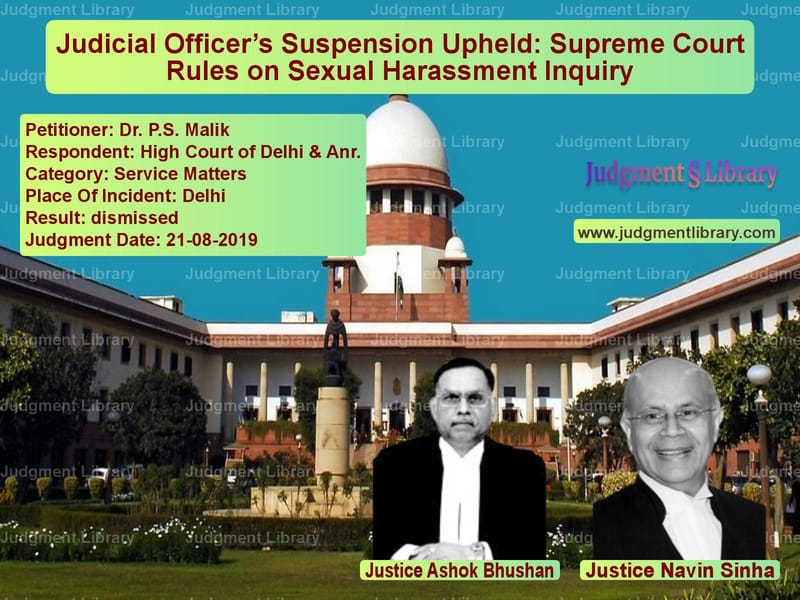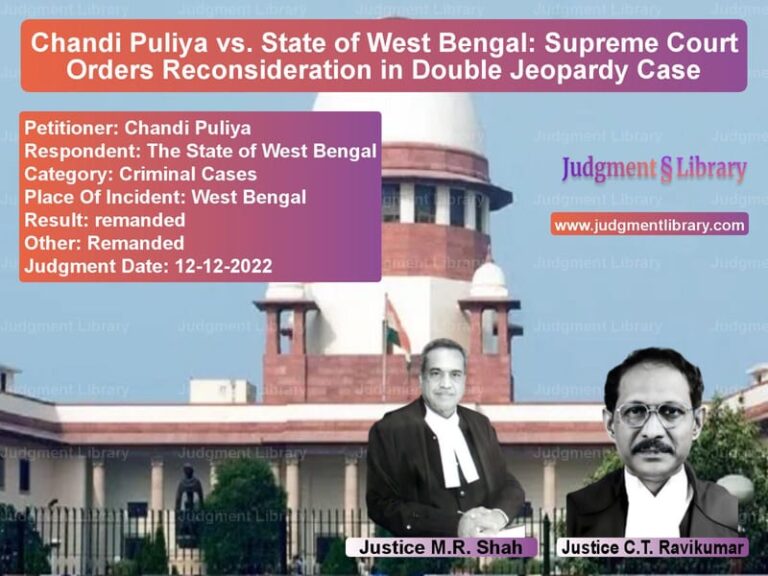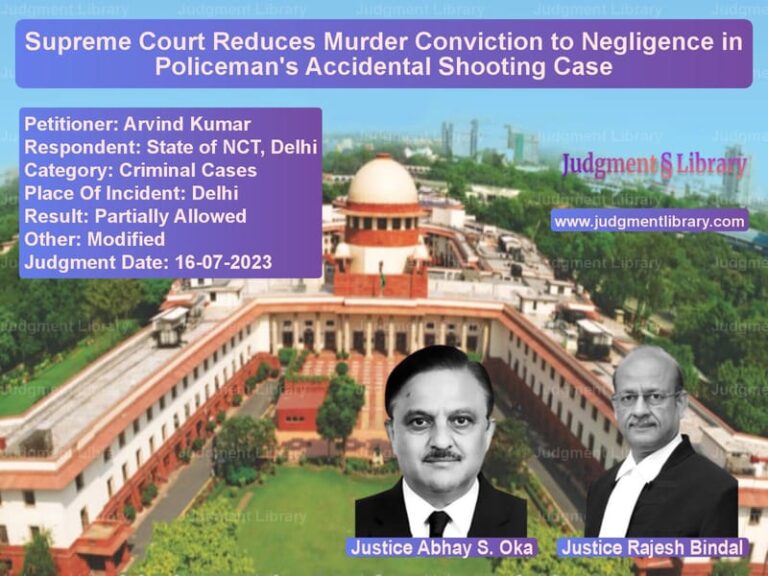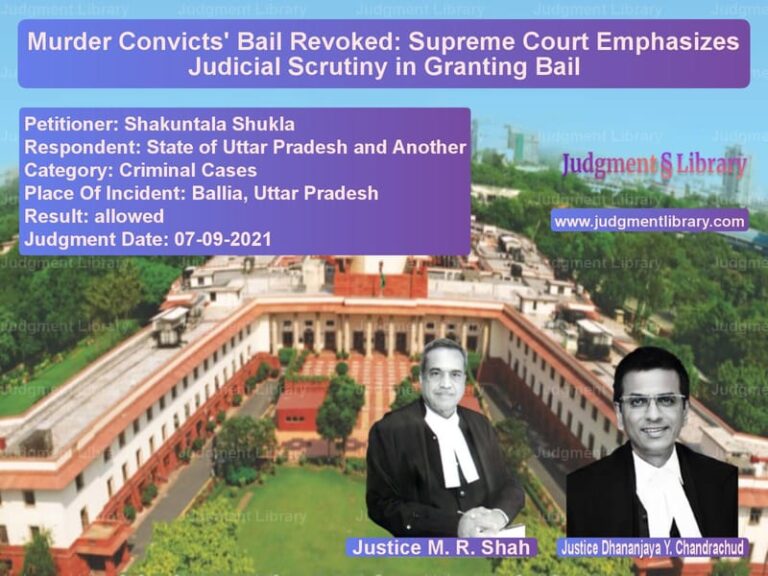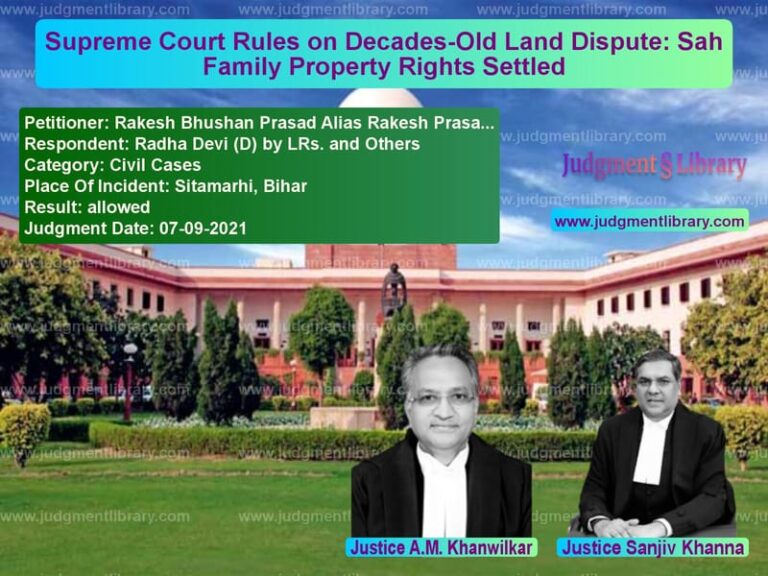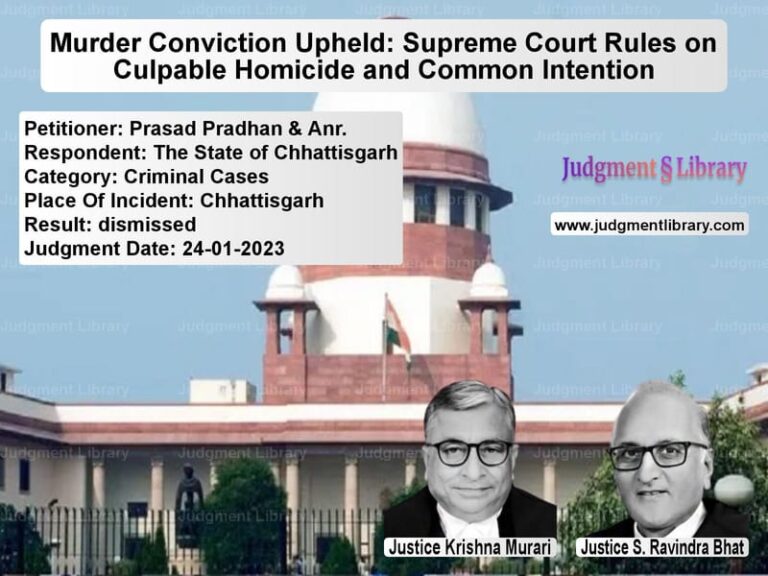Judicial Officer’s Suspension Upheld: Supreme Court Rules on Sexual Harassment Inquiry
The Supreme Court of India recently ruled in the case of Dr. P.S. Malik vs. High Court of Delhi & Anr., addressing a dispute concerning disciplinary proceedings against a judicial officer accused of sexual harassment. The judgment clarifies the High Court’s authority to initiate disciplinary action against judicial officers under Article 235 of the Constitution and the applicability of the Sexual Harassment of Women at Workplace (Prevention, Prohibition and Redressal) Act, 2013.
Background of the Case
The petitioner, Dr. P.S. Malik, was an Additional District Judge in the Delhi Higher Judicial Services. On July 5, 2016, a written complaint was filed against him by a Junior Judicial Assistant, alleging sexual harassment at the workplace. The complaint was addressed to the Chief Justice of the Delhi High Court.
The complainant, who had worked as Ahlmad in the petitioner’s court from May 18, 2015, to May 18, 2016, submitted another complaint on July 11, 2016. These complaints were placed before the Full Court of the Delhi High Court on July 13, 2016. The Full Court resolved to:
- Place the petitioner under suspension with immediate effect.
- Forward the complaint to the concerned police station for necessary legal action.
- Refer the complaint to the Internal Complaints Committee (ICC) for an inquiry.
The ICC conducted an inquiry and submitted a report on November 5, 2016, recommending disciplinary action against the petitioner. Subsequently, on February 23, 2017, the Full Court issued a charge sheet, and a full-fledged disciplinary inquiry was initiated.
Key Legal Issues
- Whether the High Court had the authority to initiate disciplinary proceedings against the petitioner under Article 235 of the Constitution.
- Whether the ICC’s inquiry was conducted in accordance with the Sexual Harassment Act, 2013.
- Whether non-supply of the preliminary inquiry report to the petitioner vitiated the proceedings.
Arguments by the Petitioner (Dr. P.S. Malik)
The petitioner contended:
- The Delhi High Court did not have jurisdiction to initiate disciplinary proceedings against him, as he was governed by the Delhi Higher Judicial Service Rules, 1970.
- The Full Court’s decision to place him under suspension without giving him a hearing was arbitrary and illegal.
- The ICC’s inquiry violated procedural safeguards under the Sexual Harassment Act, 2013.
- The preliminary inquiry report of November 5, 2016, was not provided to him, denying him an opportunity to challenge its findings.
- The charge sheet issued against him was invalid as it was not approved by the competent disciplinary authority.
Arguments by the Respondents (High Court of Delhi)
The Delhi High Court countered:
- The High Court, under Article 235 of the Constitution, had full authority over judicial officers, including initiating disciplinary proceedings.
- The ICC’s inquiry was conducted in accordance with the Sexual Harassment Act, 2013, and the petitioner was given ample opportunity to defend himself.
- The preliminary inquiry report was only an internal recommendation and did not contain conclusive findings.
- The petitioner was provided with the final inquiry report and was given an opportunity to respond.
- His claims were premature, as the disciplinary proceedings had not yet been concluded.
Supreme Court’s Observations
1. High Court’s Authority Under Article 235
The Court affirmed that the High Court had full control over judicial officers under Article 235, including the power to initiate disciplinary proceedings and suspend judges. It stated:
“The control vested in the High Court under Article 235 includes disciplinary jurisdiction over subordinate judiciary. This power is essential to ensure judicial independence and cannot be diluted.”
2. Validity of ICC Inquiry
The Court rejected the argument that the ICC’s inquiry violated procedural safeguards, ruling:
“The ICC followed due process, and its findings were based on a full-fledged inquiry where the petitioner was given an opportunity to respond.”
3. Non-Supply of Preliminary Report
The Court clarified that the preliminary inquiry report was an internal document and did not form the basis of the charge sheet. It observed:
“The report dated November 5, 2016, was a preliminary inquiry and did not contain conclusive findings. The petitioner was given the final inquiry report and had the opportunity to challenge it.”
4. Competency of Disciplinary Authority
The Court ruled that the High Court had the authority to initiate disciplinary proceedings, stating:
“The High Court is the sole disciplinary authority for judicial officers. The charge sheet issued against the petitioner was valid and in accordance with law.”
5. Prematurity of the Petition
The Court noted that the disciplinary proceedings were still ongoing and that the petitioner could raise his objections at an appropriate stage. It stated:
“The petitioner has ample opportunity to contest the allegations in the disciplinary inquiry. His writ petition is premature.”
Final Verdict
The Supreme Court ruled:
- The High Court had the authority to suspend and initiate disciplinary action against the petitioner under Article 235.
- The ICC’s inquiry followed due process, and the non-supply of the preliminary report did not prejudice the petitioner.
- The disciplinary proceedings were valid, and the petitioner must contest them through the appropriate forum.
- The writ petition was dismissed as premature.
Conclusion
This judgment reinforces the High Court’s authority to regulate and discipline judicial officers. It clarifies the applicability of the Sexual Harassment Act, 2013, and ensures that procedural safeguards do not obstruct legitimate disciplinary proceedings. The ruling sets a precedent for handling misconduct allegations in the judiciary while upholding constitutional principles.
Petitioner Name: Dr. P.S. Malik.Respondent Name: High Court of Delhi & Anr..Judgment By: Justice Ashok Bhushan, Justice Navin Sinha.Place Of Incident: Delhi.Judgment Date: 21-08-2019.
Don’t miss out on the full details! Download the complete judgment in PDF format below and gain valuable insights instantly!
Download Judgment: Dr. P.S. Malik vs High Court of Delhi Supreme Court of India Judgment Dated 21-08-2019.pdf
Direct Downlaod Judgment: Direct downlaod this Judgment
See all petitions in Disciplinary Proceedings
See all petitions in Public Sector Employees
See all petitions in Employment Disputes
See all petitions in Judgment by Ashok Bhushan
See all petitions in Judgment by Navin Sinha
See all petitions in dismissed
See all petitions in supreme court of India judgments August 2019
See all petitions in 2019 judgments
See all posts in Service Matters Category
See all allowed petitions in Service Matters Category
See all Dismissed petitions in Service Matters Category
See all partially allowed petitions in Service Matters Category

